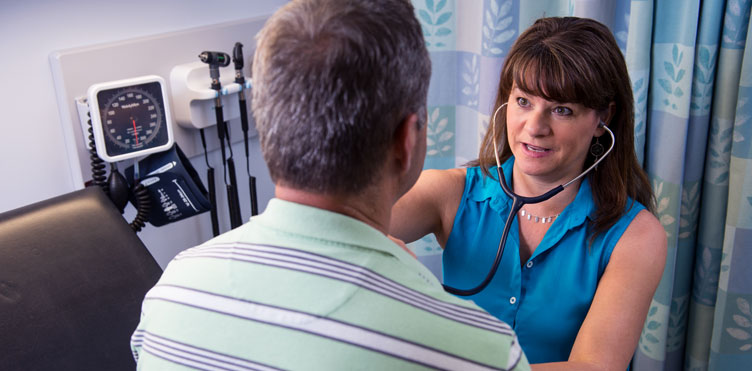Nursing

- Degrees Offered: MN, MN ANP
- Application Deadline: Jan. 15
- Study Options: Master of Nursing Thesis/Report, Master of Nursing Advanced Nurse Practitioner
- Length: Thesis/Report (2 years full-time, 4 years part-time), Nurse Practitioner (20 months full-time)
- Entry Terms: Fall
The University of New Brunswick’s Master of Nursing (MN) programs position students to advance their nursing knowledge and practice based on their unique needs and interests. Students develop integrative knowledge of theory, research, and practice and are positioned to lead from an evidence informed perspective.
The Nurse Practitioner program prepares students to advance their nursing knowledge and practice using an evidence informed approach to care for clients across the lifespan. The program builds on registered nursing knowledge, abilities, and judgments, and positions students to develop advanced practice nursing competencies and take up the role of generalist nurse practitioner.
The Thesis/Report program prepares students to advance their nursing knowledge and practice using an evidence informed approach. Students have opportunities to complete original or secondary research or substantive practice projects with stakeholder partners that position them to take up academic, research, and leadership roles.
Program Delivery Format
The Master of Nursing thesis/report program is offered online only and involves a blend synchronous and asynchronous learning (no in-person). The Master of Nursing Advanced Nurse Practitioner program is offered using a mix of synchronous online and in-person learning that requires travel to the Fredericton, Moncton, or Saint John campus for labs, exams, and clinical evaluations and to various clinical practicum sites throughout New Brunswick.
Research areas
- Violence, gender and health
- Equity oriented care
- Indigenous health and wellness
- Healthy aging
- Care transitions
- Reproductive Health and the Criminal Legal System
- Newcomer health and well-being
Current faculty
The University of New Brunswick has been educating registered nurses for more than 65 years and we have a long history of internationally-recognized research from faculty in Fredericton, Moncton and Saint John. Learn more about our researchers.
Application requirements
Applicants must meet the admissions requirements set out by the School of Graduate Studies and by the Faculty of Nursing. Admission is granted on a competitive basis and enrolment is limited.
- For both programs, a cumulative GPA of at least 3.3 or B+ level.
- For both programs, normally, a BN or BScN with courses in undergraduate statistics and nursing research. Normally, a B in these courses will be considered acceptable.
- All Nurse Practitioner program applicants also require undergraduate courses in health assessment, pharmacology and pathophysiology
- All Nurse Practitioner program applicants must be registered to practice as an RN with NANB and have a minimum of two years of full time practice experience at the time of admission. Once admitted, students must maintain continuing practice registration with NANB. Applicants are admitted to the Nurse Practitioner stream every second year (i.e. 2025, 2027, 2029 etc.)
- All MN Thesis/Report applicants are required to have active practicing membership, or equivalent, within their respective provincial/national nursing regulatory body
- For both programs, applicants must obtain three references, at least one referee should be able to comment on the applicants clinical practice and one on the applicant as a learner or provide an academic reference.
- All MN Thesis/Report program applicants must provide a written statement of their professional interests, research interests and career goals. Applicants should indicate any ongoing competing demands on their time and the modifications they propose to make to their life to integrate the extensive time commitment required to complete graduate course work and subsequent research for a thesis or report.
- All Nurse Practitioner program applicants must provide a CV, confirmation of RN practice hours from their employer(s), and a written statement of their professional interest and suitability for the autonomous role of the Nurse Practitioner.
- A completed application form
Contact us
For more information, contact mngrad@unb.ca.
Office: MacLaggan Hall, Rm. 115a
Phone: 1-506-458-7650
Related: Faculty of Nursing
